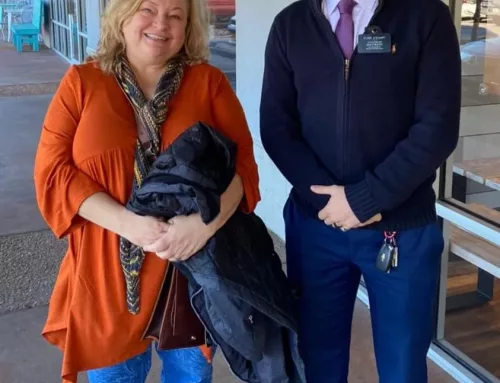Estimated reading time: 5 minutes
TALLAHASSEE – The Church of Jesus Christ of Latter-day Saints believes feeding the hungry is a core responsibility – not just during the holiday season, but throughout the year.
The Church works closely with community-based organizations to get food produced on Church farms, orchards, canneries, and ranches distributed to people in need.
Whether the effort is “farm to table” food production and distribution, or working to distribute the community’s surplus food, area organizations are laboring to feed those in need—especially as the holiday season approaches. And those needs have only increased as Covid-19 continues to take its toll on families and individuals.
Three local groups address the challenge in differing ways, but the goal is the same: feed the hungry not just today and tomorrow but in the months to come.
Bishops’ Storehouse of The Church of Jesus Christ of Latter-day Saints
“We haven’t stopped at any time during the quarantine,” said Elder Artis Hudnall, a service missionary who has volunteered for 12 years as manager of the Church’s Jacksonville Florida Bishops’ Storehouse. The storehouse provides commodities to food banks and individuals in Leon and surrounding counties.
“2020 has been a humongous year of demand, and area food banks are getting absolutely hammered,” he said. “We assess needs and do all we can to help supply food and other necessities. It’s a very rewarding job.”
The Church of Jesus Christ has canneries and farms throughout the country that produce and process fruits, vegetables, peanut butter, dairy products, and meat. When processed, these foods are sent to the Bishops’ Central Storehouse in Salt Lake City for national distribution.
This ongoing nationwide effort is largely funded by fast-offering donations, a program of the Church in which, one day every month, members fast for two meals and donate what they would have spent—or more, in many cases—to the Church humanitarian fund. The proceeds are used for numerous causes both within and outside the Church, including stocking the nationwide network of storehouses.
“When we give tours of the Jacksonville storehouse and explain the fast-offering program to people,” Hudnall said, “tears run down their faces at the magnitude of service and giving.”
Storehouse commodities include canned goods, condiments, cooking products, fresh produce, milk, meat, and pasta. Personal hygiene products and household cleaning supplies are also available.
“While (bishops’) storehouses provide many of the same services as any retail food store, not one has a cash register,” said the late Thomas S. Monson, past president of the Church. “These are goods that money cannot buy. No price tag is put on the time, effort, and love so generously contributed to the common good of those in need.”
Farm Share, Quincy, Florida
Established in 1991, Farm Share delivers—and partners with others to deliver—fresh food, free of charge, to individuals and families in need.
“We distribute food to churches, homeless shelters, and other nonprofits,” said Monica Owens, administrative assistant. “We also partner with nonprofits to distribute food to the needy. The pandemic did not slow us down. The need is still there, and we never stopped.”
Sam Carter, district coordinator of Farm Share, explained that the organization carries out two kinds of “events,” or ways to get food to people. One is having one of their food trucks travel to areas of need and distribute directly to people. The second is working through approved 501c3 nonprofit agencies, which distribute the food.
“There’s greater need now,” he said, “and what we’re trying to do is help sustain people so they can meet the extra challenges caused by Covid-19. Our commitment is to be consistent. Giving people the opportunity to have food regularly and reliably is a powerful thing.”
Carter urged churches, sports teams, and those seeking a good service project to consider becoming a Farm Share partner. “The harvest is plentiful, but the workers are few,” he said, adding that while holidays are always big, Covid-19 has made the need even bigger.
So, he issued an invitation: “We need boots on the ground. Come out and help.”
Second Harvest of the Big Bend
Second Harvest provides essential services to at-risk citizens in our region every day, according to Shari Hubbard, director of communications. Her organization is “poised to immediately respond” when a disaster or crisis occurs. She noted that, before Covid-19, Second Harvest served around 100,000 people.
“Today, food insecurity is up 50 percent in the Big Bend,” she said, “and we are providing essential food assistance to 150,000 neighbors who are struggling to find their next meal.”
To meet that need, Second Harvest has increased mobile food distributions (of canned and dry goods, fresh produce, and frozen meat) from 10-12 monthly to an average of 40 per month.
“We couldn’t do this without support from our partner agencies across the Big Bend,” Hubbard said, noting valued collaborations with Bond Community Health Center, Tallahassee Housing Authority, Urban League, and others.
In November, Second Harvest held the seventh annual WTXL Turkey Drive, collecting 1,000 frozen turkeys and more than $60,000 to fund holiday food distributions. The Thanksgiving food distribution took place Nov. 21, and Second Harvest’s first-ever Christmas food distribution event is planned for December.








